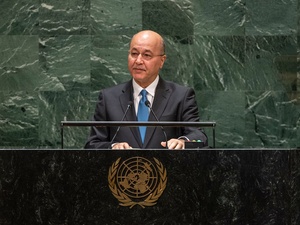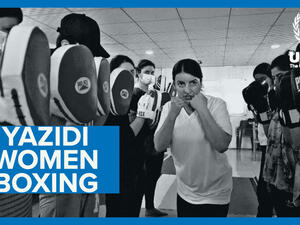Iraq: returns from Iran and Saudi Arabia
Iraq: returns from Iran and Saudi Arabia
Some 630 Iraqis have returned home from camps in Iran and Saudi Arabia in the last two days.
A convoy carrying 330 refugees arrived today in southern Iraq, ending their long exile in Saudi Arabia. The convoy of eight buses and 12 trucks was the 14th group of Iraqis to leave Rafha refugee camp, where they had lived for nearly 13 years. UNHCR-facilitated returns from Rafha began from Saudi Arabia last July.
The refugees transited Kuwait in the early hours of this morning and arrived in Iraq a few hours ago. They were met on the Iraqi frontier by CPA [Coalition Provisional Authority] personnel and escorted into Basra, where UNHCR national staff received them at our transit centre and distributed a one-month's supply of food aid and various other items, including blankets, plastic sheeting, jerry cans, and soap. Those in need also got tents. Most of today's returnees are going to Basra and Al-Muthanna.
On Monday, some 300 Iraqis also returned from camps in Iran, where some of them have been exiled for more than two decades. The refugees, travelling aboard six buses and 20 trucks, had been sheltered at Iran's Motahari and Ansar refugee camps in south-western Khuzestan Province since the Iran-Iraq war. The returning refugees underwent mine awareness training and other departure formalities at the Shalamancheh border crossing point. They were received on the Iraqi side by CPA personnel, who escorted them into Basra. As with other returning refugees, we distributed the usual assistance package and tents, if needed, at our Basra transit centre. The returnees were also enrolled in Iraq's country-wide food distribution system.
This was the fourth convoy of Iraqi refugees to leave Iran since facilitated returns started in late November. More than 800 Iraqis have returned from Iran to date on four UNHCR-facilitated convoys. This latest convoy from Iran occurred amidst a series of difficulties: in addition to the ongoing security concerns in Iraq, it was difficult to locate trucks in Iran due to the massive earthquake relief efforts in Bam. A violent storm on Saturday evening then severely damaged facilities at UNHCR's Shalamancheh transit centre, where refugees receive mine awareness training and go through last minute administrative formalities, but fortunately our Iranian partner quickly erected temporary tents to enable the movement to take place.
UNHCR is not encouraging anyone to go back to Iraq, only facilitating the repatriation of those people who are desperate to go home despite the security problems and precarious humanitarian and economic situation in the country.
Also today, 15 Turkish refugees returned to Turkey from northern Iraq in a movement facilitated by UNHCR. The small convoy, consisting of a minibus and two trucks, brought the 15 persons to the Habur gate on the Turkish-Iraqi border this morning. The refugees had been residing in northern Iraq's Dohuk Province for nearly 10 years. This voluntary repatriation was facilitated by UNHCR, and the group was registered on return by Turkish officials and UNHCR. We provided hot meals at the border and transportation to their villages of origin for those persons who were not met by relatives. With this latest movement, the total number of Turkish returnees from Iraq has reached 2,241 people since 1998.








